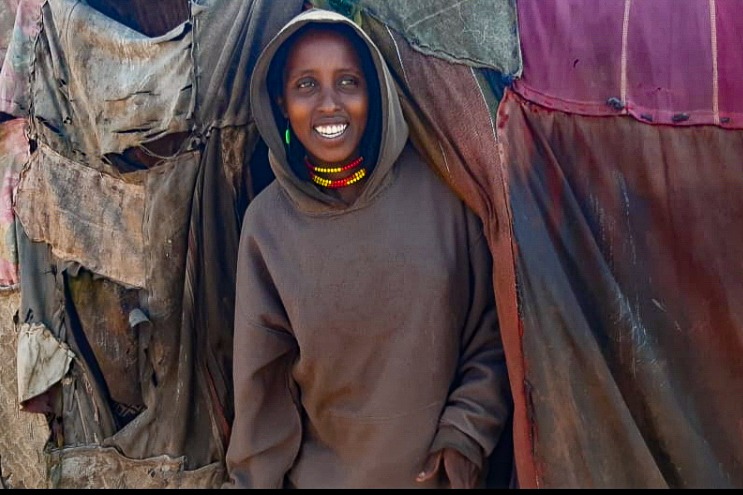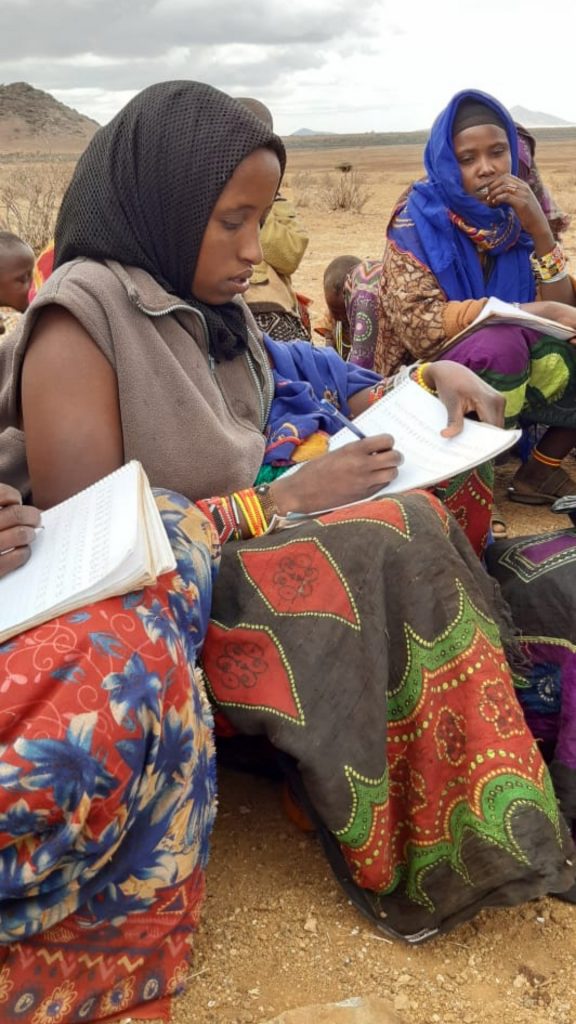
Shaake Umuro was born and raised at Shankera village of Hurri Hills in Marsabit County, 860 kilometers north of Nairobi, and 100 kilometers from the Ethiopia – Kenya border. Due to the remoteness of the area, the community faces several challenges. Since the people are predominantly pastoralists, they rely on cattle for sustenance. Many times, cyclical droughts decimate their herds exposing them to extreme need. This lack adversely affects vulnerable groups, and in Shaake’s case, mostly girls. “Due to lack of funds, I never got an opportunity to pursue formal education. Instead from an early age, my parents put me in charge of household chores,” she explains.
Girls in Northern Kenya Confront Systemic Cultural Challenges
Communities in Northern Kenya are steeped in cultural traditions and beliefs that impede girls’ growth and development. One of these harmful practices is child marriage. Statistics released in 2017 by UNICEF indicate that 4 percent of girls in Kenya are married before the age of 15. Poverty is one of the main reasons for this. Shaake was married at 14 and had her first child at 15. According to the Demographic Health Survey of 2014, one in five girls aged 15-19 years in Kenya has a baby or is pregnant. As a result, many girls are coerced or stigmatized, causing them to abandon the pursuit of formal education and opt to take care of the child. Despite the challenges she faced, Shaake sought the opportunity to rise above her situation.
In late 2019, Shaake was introduced to the Girls Improving Resilience through Livelihood (GIRL) program implemented by Feed the Future Kenya Livestock Market Systems Activity (LMS).
“When the staff of the organization came to our village, they talked to the elders and told them about the project, and they agreed to allow girls in the village to be enrolled to participate in the program. I was very excited to join as I believed I would be able to learn new things that would help me.”
–Shaake Umuro, GIRL PROGRAM participant

The GIRL program is comprised of a nine-month “safe space” training for girls ages 10-19. Participants meet once a week. The trainings, which are offered by mentors, equip them with literacy, numeracy, and life skills such as knowledge of reproductive health, nutrition, financial literacy, and business skills all within a safe setting that allows them to express themselves fully.
Shaake fully immersed herself in the project, taking the opportunity to learn and absorb as many skills as she could. As the project progressed, she started a business of selling foodstuffs within her village.
“Thanks to this program, I was able to not only learn how to read and write my name but also how to keep records and manage my income from my food stall.”
Shaake Umuro, girl program participant
Sharing Knowledge During the Pandemic
Due to the COVID-19 pandemic, the safe-space training was disrupted temporarily due to government restrictions as fewer girls were allowed to participate in the trainings at any one time. When the restrictions eased, Shaake took the opportunity to share and impart what she learned to other young mothers in her community. She started training girls not only on numeracy and literacy but also on proper hygiene, child feeding, and entrepreneurship skills.
“The responsibility of taking care of a household lies more heavily on women. Learning more skills mostly on small savings, child well-being, basic record keeping, and entrepreneurship skills will help them improve the family’s well-being and identify ways of raising money for the family.”
–Shaake Umuro, GIRL Program participant
Through the program, Shaake has learned a lot more than what was taught in the safe space.
“Before the project, I would just stay in the village with no access to skills and knowledge on how to change myself positively. I was struggling on my own with a lot of responsibilities – with the family and household chores. What I have learned is like an eye-opener for me. It will make a huge impact in terms of supporting my family and educating my children. Also, our progress as young mothers of this village will help in improving the standards of our community members and the village at large.”
–shaake Umuro, girl program participant
Aside from building the capacity of other adolescent mothers, Shaake’s work also encourages the community to support girls. One way she has done this is by creating a social support system network for young mothers in her village. By extending her new skills to other young women, she is creating a larger network of people who can lean on and support each.
The GIRL program is an activity of the Feed the Future Kenya Livestock Market Systems Activity implemented by ACDI/VOCA in coordination with partners Mercy Corps, Smart Regional Consultants, and The BOMA Project. Its life-skills model is customized for counties in northern Kenya. It creates Safe Spaces where girls improve their educational prospects by strengthening linkages that can lead to formal educational opportunities. The model also emphasizes decision-making and critical thinking. It deals with social issues like family planning, early marriage and early childbirth, nutrition, and feeding practices for children. Improved life skills enable girls to better withstand and thrive in situations of social flux and uncertainty as presented in Northern Kenya. Thus far, 8,577 adolescent girls have completed “safe space” training. LMS has disbursed USD$ 5,987 in grants for small business loans or school fees at secondary or technical institutes. The Activity also works with county governments to advise and craft policies empowering women and girls to break harmful cultural practices and protect girls.
Learn more about the Feed the Future Kenya Livestock Market Systems Activity here.
Learn more about our work in Kenya here.







